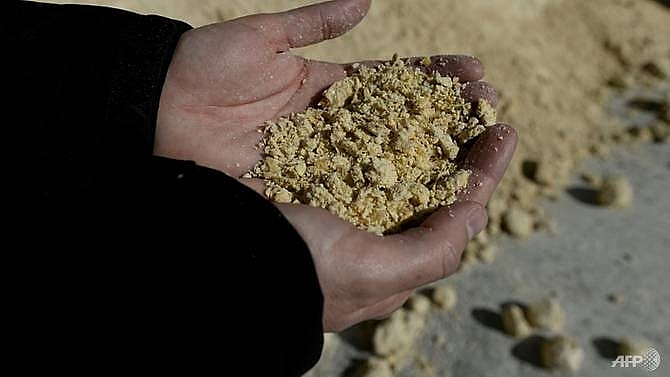Over 1m tonnes of animal feed in Europe may contain banned GMOs: report
 |
| Eight tonnes of a vitamin B2 additive produced by a genetically modified strain of the Bacillus subtilis bacteria had been sold in Europe and could have contaminated from 800,000 to 1.6 million tonnes of animal feed. (Photo: AFP/Josep Lago) |
Citing a memo from Dutch health authorities, Le Monde said that eight tonnes of a vitamin B2 additive produced by a genetically modified strain of the Bacillus subtilis bacteria had been sold in Poland, Italy and the Netherlands between April and June.
The additive, also known as riboflavin (80 per cent), is used in the feed of cattle, pigs and poultry.
Because only a small amount of additive is used, the amount of feed that may have been contaminated could run from 800,000 to 1.6 million tonnes, Le Monde quoted the Dutch authorities as saying.
The additive was produced by Chinese company Shandong and distributed by Dutch company Trouw Nutrition, owner of Nutreco, the world leader in animal feed, Le Monde said.
Some 2,500 kilogrammes has already been used in feed in Poland, the paper added.
The report comes two months after the European Commission withdrew the vitamin's authorisation and ordered it to be withdrawn from sale by Nov 10, after the European Food Safety Authority said it presented a risk for both animals and humans.
The authority said the it "poses a risk for the target species, consumers, users and the environment" due to the presence of genetically modified genes resistant to antibiotics "of human and veterinary importance".
A European Commission spokeswoman told AFP that a Rapid Alert System for Food and Feed had been triggered, but did not say what countries were targeted nor what quantity of the additive had been traced.
She emphasised that it was the responsibility of EU member states "to ensure that unauthorised products are not found on the market" and to punish those who violate the ban.
National food safety authorities have been scrambling to trace stocks of the additive since the EU banned it.
In October, Belgian authorities found a shipment of 60 kilogrammes imported from China by a Dutch-based company, Le Monde said.
It cited Dutch authorities as saying that consignments of the banned additive had also been sent to France, Germany, Norway, Russia, Finland and Iceland.
What the stars mean:
★ Poor ★ ★ Promising ★★★ Good ★★★★ Very good ★★★★★ Exceptional
 Tag:
Tag:
Related Contents
Latest News
More News
- ASEAN Digital Ministers' Meeting opens in Hanoi (January 15, 2026 | 15:33)
- ASEAN economies move up the global chip value chain (December 09, 2025 | 13:32)
- AWS unveils major AI innovations at re:Invent 2025 (December 04, 2025 | 19:06)
- Japanese embassy marks 20 years of Japan-ASEAN bond market support (December 02, 2025 | 16:57)
- Vietnam leads ASEAN in consumer optimism (November 26, 2025 | 15:58)
- CPTPP ministers convene council meeting in Melbourne, launch new accession talks (November 22, 2025 | 11:33)
- Flu wave hits Southeast Asia, highlighting gaps in protection for the elderly (November 06, 2025 | 12:13)
- 72 nations sign landmark Hanoi cybercrime convention (October 26, 2025 | 18:00)
- UN Secretary-General commends Vietnam’s global leadership (October 26, 2025 | 09:00)
- APEC finance ministers convene to tackle regional challenges (October 22, 2025 | 17:31)






















 Mobile Version
Mobile Version